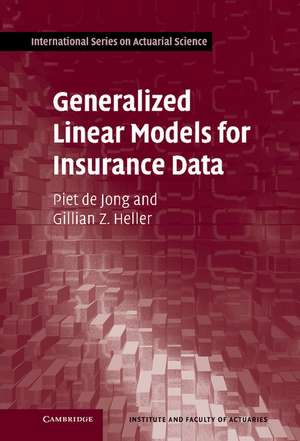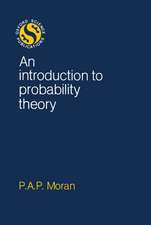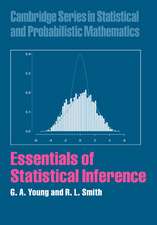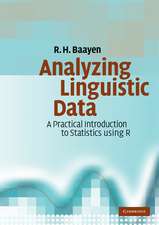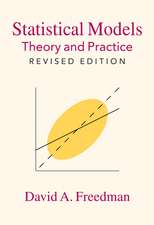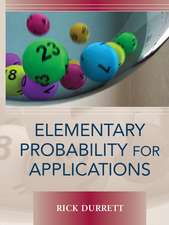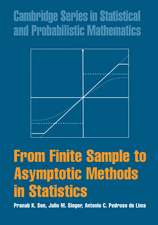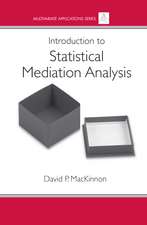Generalized Linear Models for Insurance Data: International Series on Actuarial Science
Autor Piet de Jong, Gillian Z. Helleren Limba Engleză Hardback – 27 feb 2008
Din seria International Series on Actuarial Science
- 8%
 Preț: 522.63 lei
Preț: 522.63 lei - 11%
 Preț: 485.19 lei
Preț: 485.19 lei - 8%
 Preț: 572.42 lei
Preț: 572.42 lei - 8%
 Preț: 431.26 lei
Preț: 431.26 lei - 14%
 Preț: 724.77 lei
Preț: 724.77 lei - 14%
 Preț: 901.43 lei
Preț: 901.43 lei - 11%
 Preț: 487.17 lei
Preț: 487.17 lei -
 Preț: 475.97 lei
Preț: 475.97 lei - 11%
 Preț: 458.42 lei
Preț: 458.42 lei - 11%
 Preț: 543.38 lei
Preț: 543.38 lei - 11%
 Preț: 652.53 lei
Preț: 652.53 lei - 14%
 Preț: 777.40 lei
Preț: 777.40 lei -
 Preț: 352.50 lei
Preț: 352.50 lei - 11%
 Preț: 540.91 lei
Preț: 540.91 lei - 20%
 Preț: 357.63 lei
Preț: 357.63 lei
Preț: 678.30 lei
Preț vechi: 788.72 lei
-14% Nou
129.83€ • 141.08$ • 109.13£
Carte tipărită la comandă
Livrare economică 21 aprilie-05 mai
Specificații
ISBN-10: 0521879140
Pagini: 208
Ilustrații: 34 b/w illus. 5 colour illus. 43 tables 25 exercises
Dimensiuni: 152 x 231 x 15 mm
Greutate: 0.43 kg
Editura: Cambridge University Press
Colecția Cambridge University Press
Seria International Series on Actuarial Science
Locul publicării:Cambridge, United Kingdom
Cuprins
Preface; 1. Insurance data; 2. Response distributions; 3. Exponential family responses and estimation; 4. Linear modeling; 5. Generalized linear models; 6. Models for count data; 7. Categorical responses; 8. Continuous responses; 9. Correlated data; 10. Extensions to the Generalized linear model; Appendix 1. Computer code and output; Bibliography; Index.
Recenzii
Cho-Jieh Chen, Journal of the American Statistical Association
Descriere
This is the only book actuaries need to understand generalized linear models (GLMs) for insurance applications. GLMs are used in the insurance industry to support critical decisions. Until now, no text has introduced GLMs in this context or addressed the problems specific to insurance data. Using insurance data sets, this practical, rigorous book treats GLMs, covers all standard exponential family distributions, extends the methodology to correlated data structures, and discusses recent developments which go beyond the GLM. The issues in the book are specific to insurance data, such as model selection in the presence of large data sets and the handling of varying exposure times. Exercises and data-based practicals help readers to consolidate their skills, with solutions and data sets given on the companion website. Although the book is package-independent, SAS code and output examples feature in an appendix and on the website. In addition, R code and output for all the examples are provided on the website.
